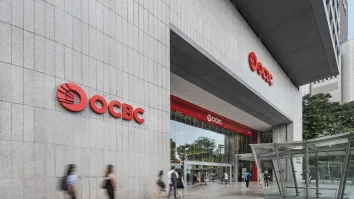
Fintechs give banks a run for their money, leverage on cryptocurrencies to cut costs in FX remittances
Find out what UOB, Krungsri, RHB, and KBANK have to say.
When UOB selected the nine startups for its FinLab accelerator, one of them was Nickel, which has developed a proof-of-concept mobile technology using blockchain to help migrant workers send remittances to their families. Asian banks are viewing the innovations coming out of financial technology (fintech) firms with some optimism, hoping that they, too, can cash in on the breakthroughs that are disrupting the foreign exchange (FX) business, from remittances to trading.
“In the recent few years, fintechs are fighting for a bigger pie in the FX remittances business, giving incumbents like Western Union, MoneyGram and even banks that do telegraphic transfers, a run for their money,” says Peter Chia, FX strategist at UOB.
He says some fintech firms like Nickel are leveraging on cryptocurrencies like bitcoin to significantly reduce the costs and waiting time in FX remittances. Through the use of the Nickel service, users can skip long queues at traditional remittances companies, and work is ongoing to build a mobile app service to also help Asian small and medium-sized enterprises (SMEs) facilitate foreign exchange payments efficiently and at a low FX rate.
More efficiency
“Mainly, fintech is related to bringing more ‘efficiency’ to the market,” says Masashi Nimura, deputy head of global markets group at Krungsri. “For clients like consumers or SMEs, they can quickly buy or sell a foreign currency at a relatively cheaper cost with more convenience in online platform or mobile application.”
He reckons that fintech firms are able to tap into process automation and offer customers lower costs for FX conversion and overseas money remittance compared with traditional transactions made through commercial banks. They also deliver increased convenience, with some startups allowing retail customers and travelers to easily compare and transact foreign exchange rates from different local money changers without the hassle of physically going to each one.
“Fintech is poised to revolutionise the way FX transactions are conducted in Asian markets,” says Ray Choy, head, FIC research, global markets at RHB Bank.
He reckons fintechs are enabling businesses to transfer money within the region in faster and more convenient ways through the use of digital devices and cutting-edge technology platforms. This results in improved execution efficiency and smoother transactions.
Supply chain and trading companies, for example, can undertake transactions without the need to exchange physical cash either through automated netting processes or credit transfer, according to Choy. These companies can also provide lending and borrowing facilities based on the liquidity flow between businesses within the same technology platform.
Choy expects that as the industry matures, fintech even has the potential to create digital currencies to replace physical currencies altogether.
E-trading taking time
The influx of fintech firms competing and working with banks has brought on a strong current of digitisation across the FX business, but the pace of adoption remains uneven in developing Asia, especially when it comes to e-trading.
“For Asian frontier markets such as Japan, Singapore and Hong Kong, where the currencies are freely traded, we are seeing more and more digitisation kicking in. However, for Thailand, we still see that as some years away,” says Thiti Tantikulanan, capital markets business division head at Kasikornbank.
“While the digitisation trend is strong, the need for the human touch in Thailand FX is still very high,” he adds. “Exporters and importers still want to talk to dealers to negotiate the rates and to update the news.”
Tantikulanan reckons many chief financial officers and finance managers still prefer to consult with dealers on other issues such as accounting and alternative hedging options.
“Fintech hasn't reached the Thai local market yet,” he says, pointing out that the alternative to the over-the-counter (OTC) market, the FX USD future market, hasn't yet drawn volume away from the OTC market.
“This is likely due to the fact that most end users in Baht FX market are businesses with hedging purposes, not the speculators, as the FX conversion is still somewhat regulated by Bank of Thailand.”
The emergence of more cutting-edge technology has continued and will continue to re-shape FX trading desks in Asia, according to Choy, changing the roles of FX traders towards more of a supervisory capacity.
“As computing power increases and software becomes more intelligent, trading activities can be potentially complemented by technology. Human FX traders will act in a governance role to ensure the system will be trading within defined parameters,” he says.
Already, he points out that digitisation is bringing wider access to markets and more competitive pricing. Not only are more players entering the field, new capabilities are also being introduced such as regional auto-matching – a similar concept to e-bidding– that are designed to provide better turnaround times and best prices among Asian regional players.
But for Nimura, despite the advantages that e-trading brings, existing regulations prevent Asian countries from fully embracing the trend.
“Despite an increasing trend of e-trading platforms taking place in the western side of the world to promote more transparent and more competitive FX market, in Asia, the development of fully-fledged algorithmic trading can only succeed in sophisticated markets where the currencies are freely traded,” says Nimura.
“For emerging Asian countries whose more stringent FX and capital controls are imposed to ensure liquidity and currency stability, the underlying business transactions remain mandatory for corporate clients to execute FX transactions. For these countries, regulation remains a major hurdle to the implementation of a freely electronic trading platform.”
“With current limited end-client flows through the e-trading platform, algorithmic trading is unlikely to be widely adopted in the Asian FX trading arena so soon.”
Increased regulations
The stringent regulatory regimes that are prevalent in Asia are not about to ease up. Analysts believe this has put a damper on the growth of FX desks, but some argue that this will enable more sustainable long-term growth and even spur on the faster adoption of e-trading.
"Currently, banks are bombarded with more stringent regulations which would have additional operation and compliance costs to comply with,” says Nimura.
“Although, on one hand, these regulations are aimed at levelling up market transparency and enhancing financial market stability, on the other, we foresee that the market would become more restrictive with less market liquidity.”
He reckons the implementation of the Dodd Frank Act, for example, would lessen proprietary trading activities as well as restrict counterparties and the types of transactions to be traded. There are also new transaction reporting and margin requirements that are raising transaction costs. But he does note that during the transition period where international regulatory requirements are not enforceable across the globe, banks in Asian countries where these international requirements have not been adopted can take advantage of lower transaction costs.
But for Choy, increased regulation has also brought on positive results such as increased self-governance and personal responsibility, and may well propel the FX market to fully embrace trading.
“The increase in information sharing, improving visibility of the FX market via trade repository recording of OTC trades, and the streamlining of financial regulation will improve the stability, visibility and price discovery of FX in the future.”
“Finally with the increased cost, increased visibility and reduced presence, there may be an increased incentive in the FX world for higher utilisation of electronic trading desks.”
In photo (from left to right): Masashi Nimura, Thiti Tantikulanan, Ray Choy



















 Advertise
Advertise











